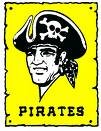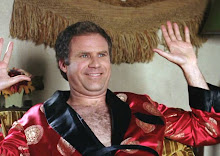With yesterday's
signing of former standout third baseman, Brandon Inge, the Pittsburgh Pirates have again shown the baseball world that they have fully shifted their approach in the most fundamental activity in the life of a pirate - hunting for treasures. This philosophical and procedural redirection can be understood through a simple analogy utilizing the new national pastime, reality TV.
In the years we now refer to as BAJ (Before AJ), the Battlins' talent hunters enlisted the legacy
Storage Wars model when it came to finding low priced talent. The concept was simple, easy to execute, and above all else, affordable. The latter attribute being most alluring to any Pirate executive. The
Storage Wars process requires the buyer to drop a blind, marginal commitment price on an unknown commodity, with the hopes that value is found inside - neglected, forgotten, and abandoned by the previous owner. In recent years the Bucs would focus on former top end prospects, players who may have been high draft picks or simply "big upside" guys, but for whatever reason were now deemed expendable by their current team. Essentially, it was a low risk, high return, slot machine approach, looking for that jackpot dream in a talented young player who just simply languished under his current owner's development system. Under this model, these were players who never truly evolved past the prospect phase. Names like Brandon Wood and Lastings Milledge typify the
Storage Wars concept.
2012 ushered in the AAJ (after AJ) era to Bucco Nation, aptly starting with the AJ Burnett acquisition from the New York Yankees. With Burnett, the value hunting mentality shifted from gambling on unknown resources to searching for some proven quality products that may now be lost, forgotten, dented, devalued, or just simply unwanted. Enter the
American Pickers phase of Pirate baseball. After the success fueled by the Burnett and (later) the Wandy Rodriquez acquisitions, the Bucs' front office went all in on the
American Pickers model. In a period of just a few months, the Bucs have inked former stars Russel Martin, Francisco Liriano, Jonathon Sanchez, and now Inge, mostly to team friendly contracts. Although many may argue against my liberal use of the label "stars" for the entirety of this group, it should be pointed out that all four players have been standouts in their careers, and not too far in the past.
The
American Pickers model must not be confused with the
Pawn Stars model, one that the Buccos employed heavily in the pre-BAJ era. That model was essentially based on bartering for old, outdated junk (Jeremy Burnitz, Matt Diaz, Lyle Overbay, Chris Gomez, Rod Barajas, Nate McLouth (II), Eric Bedard, etc, etc). The logic, often misguided, was that if you can't afford or attract the $12 million a year star, why not drop $6 million on a former star. Half price is a good thing, right? Wrong! It should be noted that most current Bucco humor is aimed at the futility of the
Pawn Wars discipline. Fool's gold is an expression commonly associated with the Bucs'
Pawn Wars years. More times than not, the six million dollar gamble would result in a grumpy, lazy veteran in his mid 30's who would be more than happy to mail it in for seven digit pay. The gold standard of Pittsburgh sports blogs,
Mondesi's House, is literally named for the Pirates' longstanding romance with this style of acquisition.
The true reality for the Bucs, as well as any other so-called small market team, is that value hunting is a vital component in the team's everyday life. Small market teams will never have that luxury to simply shop for a new pitcher or slugger with a wide open checkbook. Teams on tight budgets must spend every dollar wisely, as acquisition is about the money, and only the money. The often discussed non-monetary lures of playing in Pittsburgh are mythical and laughable. We all know that PNC is a beautiful ballpark, but no outfielder in his right mind is going to surrender millions, or even thousands, for the privilege of playing in a cosmetically appealing pasture. I adore the sights and sounds of the Vegas Strip, but I have absolutely no intentions of moving there. Today's players are concerned with Benjamins, not tugboats, skylines, or pierogies. It's about the money, and maybe a little about winning, which the Bucs aren't exactly doing either.
The small budget teams that succeed in today's sports economy are those that flourish at finding undervalued veterans to meld with their farm raised pre-free agency home growns. There is value to be found in the community of 30-something major leaguers, and accurately gauging the direction that the talent is heading is a true art form that usually eludes most clubs like the Bucs.
The current Pirate model could most certainly work. 2013 will be the bellwether season for many things Bucco, including talent evaluation and acquisition. The Pirates have an ample and interesting mix of young, developing players and experienced, proven veterans, but time is swiftly running out on the current regime. The ends must justify the means in 2013, or another structural demolition is inevitable.
Let's hope that this October will not be bringing
Hoarders or
Intervention to Bucco TV...







